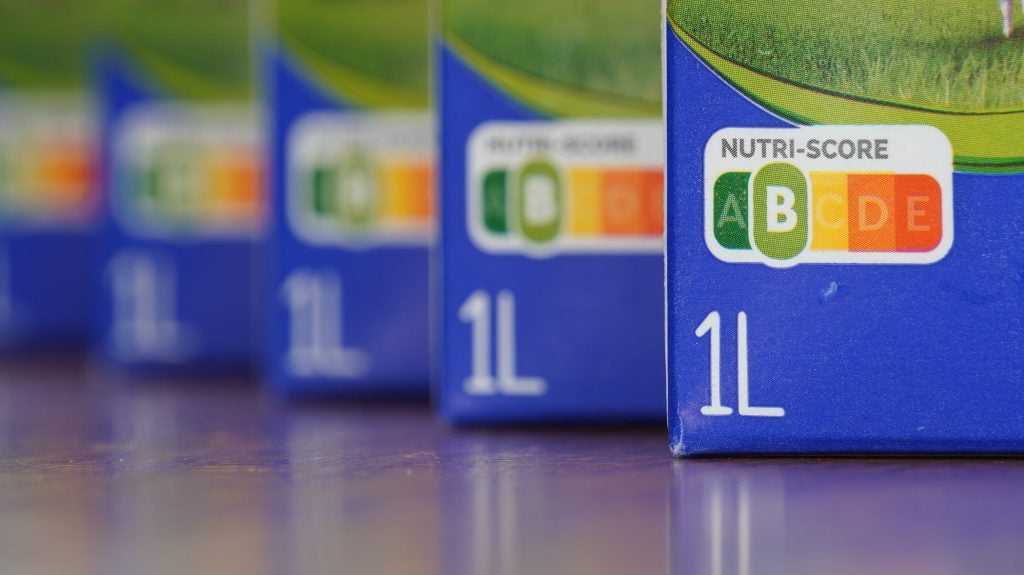If you think back to the ‘shrinkflation’ labels Carrefour slapped on its shelves last year, the French retailer has been known to adopt something of a combative stance when it comes to suppliers.
This week, Carrefour announced a similar move that might, among some major manufacturers, jeter un pavé dans la mare (that’s set the cat among the pigeons for our UK readers).
But the grocer’s latest announcement comes against the backdrop of debates in France over a tax on sugar.
Carrefour is demanding that suppliers include Nutri-Score information on products sold through carrefour.fr
And the retailer, which has used Nutri-Score nutrition labels on its own-brand products since 2019, said manufacturers that oppose the move will be named on its website.
The voluntary Nutri-Score labels, devised in France and used in several European countries, have long been a controversial system, beloved by campaigners but a source of consternation among some manufacturers (and even governments).
In September, one early supporter, Danone, removed the labels from some of its products after complaining about changes to how the A to E scores are calculated.
Danone (and French dairy peer Lactalis) refused to be drawn on Carrefour’s move, pointing Just Drinks to ANIA, the French food-industry trade body. ANIA hadn’t returned requests for comment at the time of writing. Neither had Mondelez nor Ferrero.
Nestlé, however, did respond. "Our goal is to continue to encourage consumers to use Nutri-Score as a tool for providing clear nutritional labelling on the packaging. This is why we welcome the measure introduced by Carrefour, as it will help to enable consumers to compare products and make informed decisions and towards healthier and more balanced diets," the company's French subsidiary told us.
The Swiss giant said all of its "in-scope products" (which exclude infant formula, medical products and, unsurprisingly, pet food) already display Nutri-Score info online.
Carrefour’s decision was applauded by Serge Hercberg, one of the French academics who devised Nutri-Score, in the 2010s. "Congratulations Carrefour! Nutritional transparency is a consumer right and a duty of manufacturers.
It is not normal that Ferrero, Coca-Cola, Lactalis, Mars, Mondelez, Danone, Bjorg… refuse to display the Nutri-Score on their products, knowing that it is useful information to help consumers make informed choices when making a purchase," Hercberg posted on LinkedIn.
The retailer's move was also backed by campaigners. "The more products that are labelled with the Nutri-Score, the more useful it will be for consumers, allowing them to make better-informed nutritional comparisons in the supermarket," Emma Calvert, senior food policy officer at BEUC, the pan-European consumer advocacy group, told Just Drinks.
"In the continued absence of an obligatory EU front-of-pack nutritional label, it is encouraging to see retailers such as Carrefour putting some pressure on producers who have been reluctant to be transparent and display their Nutri-Score to consumers. We hope to see more retailers taking further action to encourage the use of the Nutri-Score by their suppliers."
France-based campaign group Foodwatch, which tends to adopt a more combative tone against the food industry in its communications, took to a social media with its own call for other French grocers to come to the fore.
"At a time when Nutri-Score is under attack from all sides by lobbies, Carrefour's decision supports greater access to nutritional information on food. E.Leclerc is already doing it. Will other distributors follow suit in this approach?" Foodwatch wrote, tagging the accounts of Intermarché, Groupement des Mousquetaires Système U and Auchan.
There does appear to be some broader context to Carrefour’s move. On Wednesday, Carrefour CEO Alexandre Bompard posted on LinkedIn the letter he said the retailer had sent to more than 500 suppliers to inform them of its decision.
In a brief statement (headed Vive le Nutri-Score !) on the social-media network, Bompard said: “Before we ask ourselves whether or not to tax sugary products, let’s start by giving our customers full information about what they consume.”
And a tax on sugary foods is a live issue in France, with a proposal for a levy having, so far, divided the country’s government.









